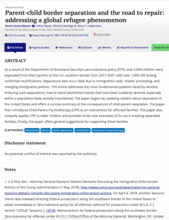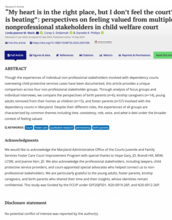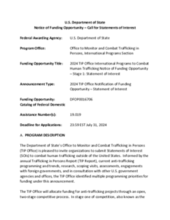Displaying 51 - 60 of 2221
Legislation now before Congress seeks better accounting of “hidden foster care” — a widespread but poorly regulated practice relied upon by child welfare agencies to shuffle kids out of their parents’ homes without court oversight.
Legislation aimed at better protecting youth sent to residential treatment centers in California — a bill inspired by an Imprint and San Francisco Chronicle investigation — has been signed into law by Gov. Gavin Newsom.
This paper addresses the consequences of child-parent separation at the U.S. southern border and offers suggestions for supporting these families including child-parent psychotherapy.
The Summit is a high-level event, bringing world leaders together to forge a new international consensus on how we deliver a better present and safeguard the future.
This article provides a unique comparison of four non-professional stakeholder groups involved with dependency courts overseeing child protective services cases in the state of Maryland in the United States.
After months of languishing in an abusive boarding school in Jamaica — where boys said they were beaten, waterboarded, starved and whipped — Michigan teenager Elijah Goldman begged to come home.
This U.S.-based study aimed to get recommendations from stakeholders with lived and/or professional experience in foster care to understand how to increase participation in research and how to capture a broader representation of those impacted.
This paper aims to examine the social support network structures of youth in out-of-home care in the U.S. and to delineate the type of social support activities provided by kin and fictive kin within the networks.
The Department of State’s Office to Monitor and Combat Trafficking in Persons (TIP Office) is pleased to invite organizations to submit Statements of Interest (SOIs) to combat human trafficking outside of the United States.
- Job Id: req52072
- Location: Louisville, KY





